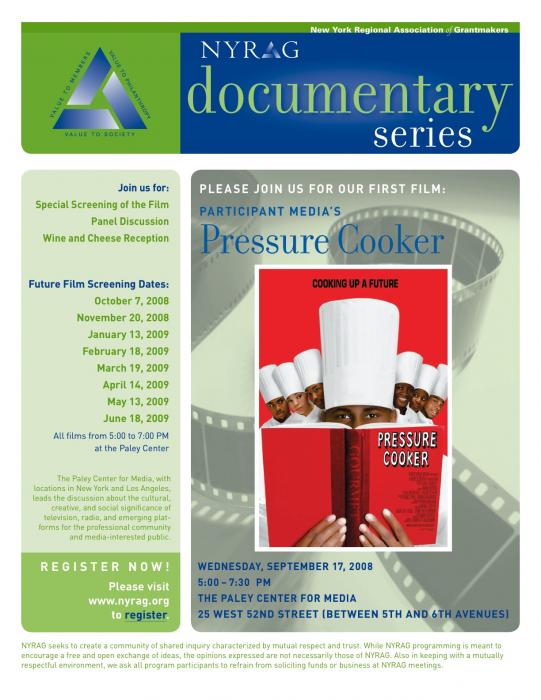
NYRAG Launches Documentary Film Series: A Conversation with Orlando Bagwell

Nine events are planned, and each will include a panel discussion moderated by the Documentary Film Series Program Chair Orlando Bagwell, Director of the US Media, Arts and Culture Program at the Ford Foundation. Tonight’s panelists for the NYRAG Documentary Film Series will include John Schrieber, Executive Vice President of Social Action & Advocacy for Participant Media along with one of the two film directors Jennifer Grausman or Mark Becker. The project is supported by the Ford Foundation and Surdna Foundation. Grantmakers in Film + Electronic Media contacted Orlando Bagwell by e-mail to find out more about the series and why the collaborating partners feel the series is a worthwhile endeavor.
GFEM: What do you hope the community of funders will get out a typical screening experience?
Orlando Bagwell: Documentaries or non-fiction storytelling can often inform and inspire audiences. Through the exploration of people’s lives, dramatic documentary storytelling places the audience at the center of [an] unfolding crisis or amazing achievements, often revealing our capacity to overcome what seem to be insurmountable obstacles.
GFEM: What was your goal in conceiving the series?
Orlando Bagwell: Each screening will try to either find connections to a timely event like the anniversary of Hurricane Katrina or attempt to introduce our audience to people and experiences that are new and unfamiliar but hopefully resonates as a testament of our share humanity. We are searching for new as well as formerly released documentaries that dramatize the potential of communities, showcase the individual spirit of achievement and struggle and reveal the many ways good dramatic storytelling can open opportunities to engage a complex of social issues, illustrate personal growth and incite the deliberation of issues in the public sphere.
After each screening we will invite the filmmakers and other guests to discuss, not only the goals of the project, but to talk about the many different ways their project can be a useful tool for civic engagement, classroom learning or a toll for facilitating meaningful conversations on important issues. Questions about new technologies and opportunities to create multi-versioned products to reach people with content and products they can use in specific environments like classrooms or on cell phones will explore the opportunities of connective technologies to build public engagement and connect communities on issues.
GFEM: Who should come to the screenings?
Orlando Bagwell: Anyone interested in the role and impact of media in society and how media can be used to serve specific education, social justice, culture and political engagement activities.
GFEM: How are the films selected in terms of criteria, connections to particular issues or funders?
Orlando Bagwell: Films will represent exemplary projects as well organizations with a track record of using films strategically to intervene in public discourse, policy considerations and individual learning and education. Hopefully, through the screenings and discussions, we will all learn new ways media products can be a part of strategies to address the particular social, political and cultural goals we confront in our work as funders and community servants. But the series will pursue good examples of documentary productions that are dramatic, inspirational and basically just guaranteeing a good evening out at the movies.
GFEM: Can you give us a sneak peek at upcoming issues that will be addressed in the series? We know you have programs focused on the Gulf Coast and the environment upcoming – is there anything else currently planned?
Orlando Bagwell: In October we will premiere a Frontline film by producer/journalist June Cross, Old Man and The Storm. It documents the rebuilding process by Herbert Gettridge, an octogenarian patriarch of a fourth-generation New Orleans family from the Ninth Ward. It is set to air on PBS’s Frontline during the winter of 2009.
In the discussion afterwards, we will be joined by Frontline’s executive producer, David Fanning, who, with June, will detail Frontline’s efforts to include the content and investigative materials of this film as a part of Frontline’s effort to make news and information content available for broad public use online. In November we will present a film on sustainable resources and the environment, we will announce this film in the near future and working with suggestions from a committee of NYRAG members, we are trying to find appropriate presentations that connect to national and local anniversaries and events as well as respond to the pressing issues facing the American public. We have purposely tried to not plan too far into the future to preserve opportunities to respond to unexpected new products, the opportunities for premieres as well unexpected events.
GFEM: Would you say that the funders represented by the films in the series will represent a broad range of foundation types?
Orlando Bagwell: Hopefully we will include films with funding from lots of different funders as well as opportunities to see films produced by independents makers but aligned to major documentary distributors like HBO and Participant films. In all cases, what will guide our decisions are the “long tail” goals of the production and the ways it represents strategic public engagement, good production and business models and an interest to serve the public.
Future Screening Dates:
October 7, 2008
November 20, 2008
January 13, 2009
February 18, 2009
March 19, 2009
April 14, 2009
May 13, 2009
June 18, 2009
Visit NYRAG.org for ongoing program updates.


